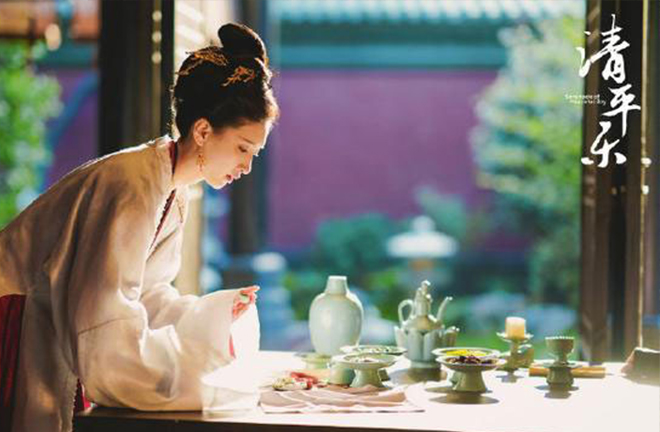Historical drama can do better transmitting Chinese culture

A stage photo of the drama Serenade of Peaceful Joy Photo: FILE
The historical drama Serenade of Peaceful Joy has been one of the most heatedly discussed dramas on TV. Though off air for some time, its popularity has not abated, and it has even become one of the most searched hashtags on social media. Indeed, compared with other historical dramas, it has some praiseworthy points, the most remarkable being its effort to transmit refined traditional Chinese culture.
A reflection on the film and television works of recent years shows that some so-called palace dramas, time-travel dramas and fantasy dramas with high ratings or click rates are often divorced from and even contrary to historical truth, though they wear the mask of history. Obviously, this kind of “pseudo-historical creation” not only fails to shoulder the important task of passing down traditional Chinese culture, but also may spread the wrong historical and cultural views as well as social values to the public.
In contrast, Serenade of Peaceful Joy presents us with a completely different cultural landscape, which is especially seen in the drama’s vivid demonstration of the key Confucian thought “benevolence, righteousness, courtesy, wisdom and faith.” By portraying Zhao Zhen, Emperor Renzong of the Song Dynasty who ruled the state by means of “benevolence,” the drama displays the rich connotation embodied in “benevolent governance.” Many historical scenes are vividly depicted: the painful experience of being estranged from his biological mother; a series of people-centered governance strategies centered around thriftiness after he came into power; entrusting Fan Zhongyan (a stateman and scholar of the Song Dynasty) with an important official position; the implementation of new reform policies. In addition, elements such as “political intrigue” and “tricks and scheming” prevalent in some other historical dramas are also filtered or converted to the greatest extent by Serenade of Peaceful Joy.
Secondly, one theme of the drama is the Song Dynasty as one of the golden ages of China’s cultural prosperity and development. It shows us for the first time some of the most iconic cultural figures belonging to this particular era, and each of them is distinctive in personality and character. Yan Shu’s wisdom, Han Qi’s loyalty, Fan Zhongyan’s frankness, Ouyang Xiu’s pursuit of freedom, Xia Shi’s tact, Su Shi’s talent ... All of them are impressive.
The cultural masters and the scene of their discussions in the court mainly show the mainstream and upper-class culture of the Song Dynasty, but the reflection of some unique folk culture of the dynasty also stands out. For example, the depiction of the food culture in the Song Dynasty represented by “candied fruit” is quite intriguing. Emperor Renzong uses candied fruit to show filial respect to his mother; the emperor’s son-in-law Li Wei uses candied fruit to express his love for Princess Huirou, and Liang Huaiji’s family subsist by making candied fruit—three plots all tied together by an internal logic. The drama vividly depicts the craft, ingredients, flavor, quality and market condition of candied fruit in the Song Dynasty. In addition, the drama also displays baked cakes and other delicacies in the Song Dynasty. It can be said that these plot designs not only show the colorful picture of the culinary culture of the Song Dynasty but also vividly display the life of common people in the dynasty.
However, Serenade of Peaceful Joy also has the problems that most historical dramas have.
First, the drama does not completely break the mold of “imperial-scheming.” Some of the plots need to be further considered. For example, the drama tells the story of three concubines backstabbing and playing cunning schemes against each other in order to win the love of the emperor. The design of such a plot is generally against historical truth. Another case in point is that the character design of Princess Huirou is not rational, which runs against historical logic and is false art.
In addition, the drama is dissatisfactory in terms of its grand narration of major historical events. Some other excellent TV series such as Kangxi Empire, Great Qin Empire and Emperor Wu Of the Han Dynasty are unique in artistic value through outstanding interpretation of historical figures and events. Serenade of Peaceful Joy, however, is less than satisfactory in this respect. The protagonist Emperor Renzong was a great ruler in history who played an important role in boosting the resplendent culture of the Song Dynasty. For such a historical figure, the script should delve deeply into some related symbolic historical events, especially by analyzing the internal logic between these events through grand narration. However, the drama lacks such artistic originality. Although the work does focus on some major historical events, it adopts a fragmented narrative approach, which makes it difficult to present the detailed decision-making and concrete implementation process of these events. As a result, many viewers do not have a deep understanding of the pertinent historical context. This is also another important issue worth reflection for contemporary historical dramas, especially regarding the transmission of traditional Chinese culture.
Ma Lixin and Mao Zhen are from the School of Journalism and Communication at Shandong Normal University.
edited by BAI LE
